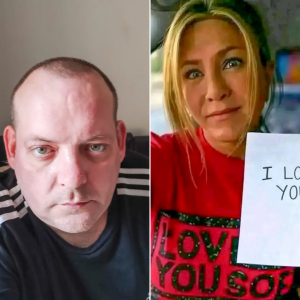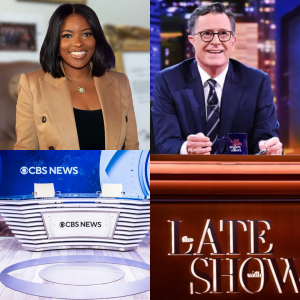The lights were the same, the desk was the same, but the man behind it was different. On Thursday night, Seth Meyers dispensed with his usual lighthearted banter and stared into the camera with a gravity that silenced the studio audience. He was there to talk about the sudden, chilling disappearance of his friend and peer, Jimmy Kimmel, from the nation’s airwaves—and the powerful forces that made it happen.

“It is a privilege and an honor to call Jimmy Kimmel my friend,” Meyers said, his voice steady but laced with a quiet fury. It was a stark departure from the sarcastic performance he had given only moments earlier, a biting piece of political comedy in which he feigned allegiance to the very administration that had just engineered a stunning act of media censorship. “I’ve always admired and respected Mr. Trump,” Meyers had quipped to nervous laughter. “If you’ve ever seen me say anything negative about him, that’s just AI.”
The joke landed, but the reality behind it was anything but funny. This was defiance broadcast live, a direct response to the unprecedented Jimmy Kimmel suspension that has sent shockwaves through the media landscape.
The crisis ignited on Monday, after Kimmel, in a blistering monologue, took aim at the rhetoric of conservative activist Charlie Kirk and the “MAGA mob.” The specifics of the joke almost immediately became secondary to the institutional reaction it provoked. The response came not from a rival network, but from the heart of the federal government.
Brendan Carr, the Trump-appointed chairman of the Federal Communications Commission, appeared on a conservative podcast and issued a thinly veiled ultimatum. “We can do this the easy way or the hard way,” Carr warned, directing his comments at ABC’s parent company, Disney. “These companies can find ways to change conduct and take action, frankly, on Kimmel or there’s going to be additional work for the FCC ahead.”
It was a stunning threat of regulatory retaliation from the Trump FCC, an agency tasked with overseeing the public airwaves, not policing political speech. The “hard way” was left ominously unsaid, but the message was clear: silence the critic, or the government will intervene.
The threat didn’t have to be spelled out. Within 48 hours, Nexstar Media Group and Sinclair Broadcast Group, two of the largest and most powerful owners of local television stations in the country—both with well-documented conservative leanings—announced they would no longer carry “Jimmy Kimmel Live” on their ABC affiliate stations. ABC, facing a massive hole in its nationwide distribution, quickly capitulated, halting production on the show indefinitely.
Just like that, one of the most prominent voices in late night was gone.
Donald Trump celebrated the move on his Truth Social platform. “Great News for America: The ratings challenged Jimmy Kimmel Show is CANCELLED,” he wrote. “Congratulations to ABC for finally having the courage to do what had to be done.” He then turned his attention to his next targets: “That leaves Jimmy and Seth, two total losers, on Fake News NBC. Their ratings are also horrible. Do it NBC!!!”
This sequence of events—a comedian’s controversial joke, a direct threat from a government regulator, immediate compliance by politically aligned corporations, and a president’s gleeful endorsement—is a textbook example of the “chilling effect.” It’s a tactic designed not only to punish a specific person but to send a terrifying message to everyone else: step out of line, and you are next. The core principle of freedom of speech, enshrined in the First Amendment, was being tested not in a courtroom, but in a corporate boardroom under duress.
Former President Barack Obama was among the many who saw the danger, calling the situation “an attack on free speech and a sign of the Trump administration intimidating media companies to fire reporters and commentators it doesn’t like.”

This is the tense, high-stakes environment in which Seth Meyers delivered his monologue. His words were not just a defense of a friend, but a defense of an ideal. By continuing to do his show, by continuing to engage in the sharp political comedy that put a target on the backs of his colleagues, Meyers was refusing to be chilled. He was, in effect, looking the bully in the eye and refusing to flinch.
The history of American comedy is filled with figures who have spoken truth to power, from Lenny Bruce to George Carlin, from the Smothers Brothers clashing with network censors over the Vietnam War to Stephen Colbert’s legendary roast of George W. Bush at the 2006 White House Correspondents’ Dinner. What makes the Kimmel situation so profoundly different, and so much more alarming, is the overt and successful weaponization of a government agency to enforce a political agenda. Carr’s praise for Nexstar—”I want to thank Nexstar for doing the right thing”—erased any doubt that this was a coordinated play.
The battle over Kimmel’s show is a microcosm of a larger war against the press and any form of critical commentary. For years, the term “Fake News” has been used to erode public trust in journalism. Now, that rhetoric has been coupled with the raw power of federal regulatory bodies to achieve what words alone could not: outright media censorship.
As Meyers concluded his somber remarks, he brought the focus back to the fundamental privilege of his job, a privilege that now feels fragile and endangered. “I wake up every day, I count my blessings that I live in a country that at least purports to value freedom of speech,” he said, the word “purports” hanging heavy in the air. “And we’re gonna keep doing our show the way we’ve always done it: with enthusiasm and integrity.” In an era of intimidation, simply continuing to do one’s job with integrity has become a radical act. The laughter in the studio may have been quieter on Thursday, but the stakes have never been louder.






